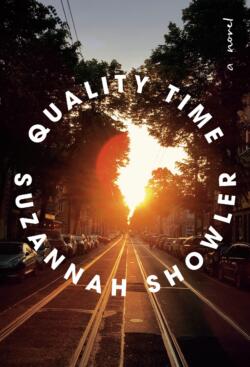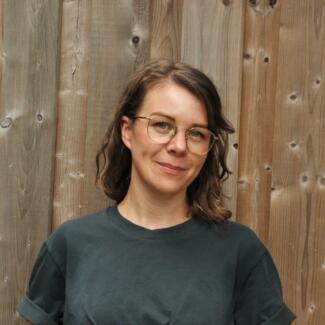1887 Truly madly deeply
Quality Time
By Suzannah Showler
Toronto: McClelland & Stewart, 2023
$24.95 / 9780771003684
Reviewed by Bill Paul
*
 Quality Time is a romantic comedy about a young couple madly in love and living in Toronto during Rob Ford’s era as mayor. Lydie and Nico (short for Nicolas) are discovering the myriad pleasures and worries that come with emotional intimacy, memorable sex, cheating on your partner, hook-ups, and hangovers. West Coast author Suzannah Showler (a poet and essayist) deftly investigates the misadventures and intensity of youth, presenting us with characters who are painfully self-aware and mindful that “the day wasn’t enough to contain them.” The novel’s premise is based on Lydie and Nico’s interest in reenacting moments from their first year together as a couple (an idea that Nico eventually takes up in earnest)
Quality Time is a romantic comedy about a young couple madly in love and living in Toronto during Rob Ford’s era as mayor. Lydie and Nico (short for Nicolas) are discovering the myriad pleasures and worries that come with emotional intimacy, memorable sex, cheating on your partner, hook-ups, and hangovers. West Coast author Suzannah Showler (a poet and essayist) deftly investigates the misadventures and intensity of youth, presenting us with characters who are painfully self-aware and mindful that “the day wasn’t enough to contain them.” The novel’s premise is based on Lydie and Nico’s interest in reenacting moments from their first year together as a couple (an idea that Nico eventually takes up in earnest)
Raised in small town Ontario, Lydie is an energetic, down-to-earth character who’s hungry for experience. For now she works at a dull job as a personal assistant to the manager at the Toronto Academy of Dance. Several years back she studied Studio Art (drawing and painting) at university and won some accolades after receiving a provincial art award; she hopes to one day show her work in a gallery. Lydie moves among self-deprecating, bohemian characters who talk and text, sharing their regrets and confessions with one another. Compared to her peers Lydie feels “like her own life hasn’t even started yet.” Yet her friends recognize her talent as a fledgling painter and provide her with advice and encouragement. Here’s Showler telling us about Lydie’s two closest friends:
“Gwen and Rachel both grew up in Toronto, attended private schools. Kilted, all-girls for Gwen; a Jewish day school for Rachel. When they met in undergrad, Lydie had not really understood what the signifiers meant. How Gwen’s family not only attended but hosted thousand-buck-a-plate Liberal Party fundraisers at their home in Rosedale…. Lydie’s friends had their own struggles, their own damage. And yet their lives were underwritten, fail-safe in some fundamental way it was hard to put a finger on. Rachel and Gwen were the friends of Lydie’s life–until Nico, the most meaningful relationships she had ever formed with other humans. Living together when they were so young, some of their natural imperviousness, or at least the idea of it, had seemed to rub off on Lydie.”
Unlike Lydie, Nico’s background is French-Canadian. He has a younger brother named Alex. Nico’s sensibility is similar to the racoons (known as “trashpandas” in the book) who make their appearance in the “high hours of the night,” crossing through backyards and hustling down alleyways. In other words Nico’s a scavenger who “imagined how everything might be remodelled … every object a new call to usefulness.” He’s a dreamer and a schemer, a charming, sweet-talking ladies’ man, who once pursued post graduate work in linguistics until he lost his drive and patience and dropped out of university. These days he makes his living as an English-French translator of technical manuals and “RFPs from engineering firms.” In his spare time he follows his interests to where ever they take him. One of those interests is growing a vegetable garden on the gravel roof of his apartment building. Another is a lifestyle idea that he plans to market on-line called Quality Time (ie, “Your life and your time are one and the same.”)

Showler is a skilful, observant writer who’s good at presenting what her characters are thinking and feeling. Her language is specific and nuanced. There’s a dash of flair to her writing. The tone can be brisk and playful or funny and dry. This is her description of a semi-relaxed Lydie attending the boisterous, alcohol-fuelled bachelorette party of Amy (Alex’s girlfriend), held at a condo in Toronto’s Harbourfront neighbourhood:
“Soon, Lydie is on the couch sucking a future headache into her skull through a straw shaped like a tiny, purple penis. It’s her second drink, so sweet it makes her gums ache. There is scream-laughing, a centrifugal force coming together in the air, feeling for a point of focus. Lydie senses a night that could end in tears, someone telling someone else how much she loves her, how beautiful she is—the camaraderie not so much souring as ripening, going soft in the middle, finding its final form.”
The novel relies less on plot and more on anecdotal storytelling and recreating moments and situations that the two main characters experience. For instance: Lydie walking to work early in the morning and suddenly overtaken by the sight of “allergic fluff wafting across her view like faux snow,” or riding the streetcar and sensing a rush of heat to her face and needing to get “away from the prickly transit smell, all the bodies, suddenly too much, not worth it.” Or the time years back when she shared a house with several roommates who were “gig musicians a few years out of the jazz program at Humber.” This memory finds Lydie sitting in a young man’s room, lying on his bed (“Not sexy, just stoned”) and noticing how the man’s “bedspread smelled like bong water and dryer sheets and crusts of old cheese scraped off a pan.”
In a recent on-line interview, Showler was asked about setting the book in the not-so-distant past in Toronto. She said: “I think whatever historical moment you’re in when you’re a young adult remains alive to you.” In Quality Time, Nico’s preoccupation with his lifestyle idea wears thin and gradually the project seems to undermine the relationship the couple have built up. Showler has written a tribute to romantic love that slowly turns into a coming of age of story that focusses on Lydie. This is her story, really. Coming near the end of the novel as the bachelorette party winds down, Lydie finds herself dancing with Amy at a night club. Showler writes: “She pretends the roof is the night and tilts her head back, lets the ceiling be the sky, a place people look in pain or in hope, a place they call on when they’re asking for more, looking for answers, deliverance, or with gratitude, finding what they already have or know they could or will.”
*
East Vancouverite Bill Paul enjoys photography and reading fiction and non-fiction. Editor’s note: Bill Paul has also reviewed books by Curtis LeBlanc, Patrick deWitt, Barbara Fradkin, Dietrich Kalteis, Stan Rogal, Keath Fraser, and John Farrow, and contributed a photo-essay, Trevor Martin’s Vancouver, to The British Columbia Review.
*
The British Columbia Review
Interim Editors, 2023-24: Trevor Marc Hughes (non-fiction), Brett Josef Grubisic (fiction)
Publisher: Richard Mackie
Formerly The Ormsby Review, The British Columbia Review is an on-line book review and journal service for BC writers and readers. The Advisory Board now consists of Jean Barman, Wade Davis, Robin Fisher, Barry Gough, Hugh Johnston, Kathy Mezei, Patricia Roy, Maria Tippett, and Graeme Wynn. Provincial Government Patron (since September 2018): Creative BC. Honorary Patron: Yosef Wosk. Scholarly Patron: SFU Graduate Liberal Studies. The British Columbia Review was founded in 2016 by Richard Mackie and Alan Twigg.
“Only connect.” – E.M. Forster
5 comments on “1887 Truly madly deeply”